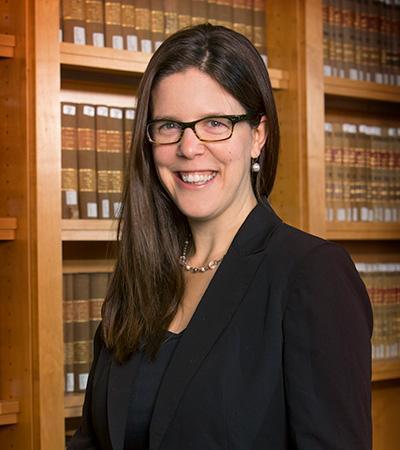
Shoemaker presents at food law and policy conference
18 Apr 2024
Professor Jessica Shoemaker is an invited panelist on the “A Reflective Look at the Intersections of Ownership, Control, and Environmental Protection in Rural Environments” panel at the Resnick Center and Academy for Food Law and Policy conference hosted at UCLA Law.
The conference on the past, present, and future of the field of food law and policy is being held in celebration of the Resnick Center for Food Law & Policy’s 10-year anniversary.
Shoemaker will present her work on changing land ownership patterns across the American countryside and related issues of economic and environmental justice, which was completed as part of her Andrew Carnegie Fellowship.
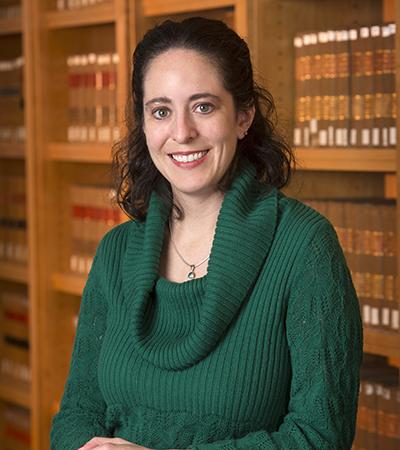
Blankley elected AALS Chair of the Section on Alternative Dispute Resolution
16 Apr 2024
Professor Kristen Blankley has been elevated from Chair-Elect to Chair of the Section on Alternative Dispute Resolution for the Association of American Law Schools. In her role as Chair, she will oversee the Section’s Works-in-Progress Conference, two section awards, and a new mentorship program.
The AALS Section on Alternative Dispute Resolution promotes members’ interests, activities, and communication of ideas, and provides a forum for discussion of matters of interest in the teaching, research, and improvement of the law and practice relating to Alternative Dispute Resolution, including negotiation, arbitration, mediation, and other dispute resolution processes.
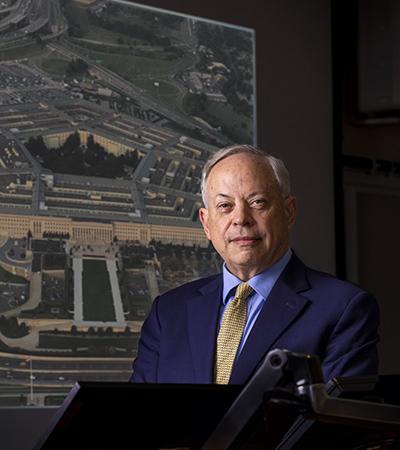
Renamed Space, Cyber, and National Security Law Program Celebrates 15 years
05 Apr 2024
In celebration of 15 years of legal education and highlighting its globally recognized expertise in national security, the Nebraska Space, Cyber and Telecommunications Law Program is changing its name to the Nebraska Space, Cyber and National Security Law Program.
First launched in 2008, a defining feature of the program has been its longstanding relationship with the U.S. Air Force and Department of Defense. This is showcased by the more than 50 U.S. Judge Advocate General’s Corps officers who have completed the program — including JAG officers in the Air Force, Army, Navy and Marine Corps. Graduates also include civilians working in numerous U.S. government agencies and departments, including the CIA, National Security Agency and Coast Guard.
Jack Beard, director of the program, who previously served as the associate deputy general counsel (international affairs) in the Department of Defense and is a lieutenant colonel in the U.S. Army JAG Corps (retired), brings his years of experience to the program’s leadership. The creation of the U.S. Space Force and the continuing focus of the U.S. Space Command and U.S. Cyber Command has made attorneys and policymakers with specializations in the space and cyber fields pivotal to U.S. national security.
The program is available to Nebraska Law’s traditional juris doctor students, who may concentrate their studies in the area, and via online and on campus Master of Law options. Courses focus on space law; cyber law; the law of armed conflict; intelligence law; and other laws, regulations and policies related to security issues and relevant fields of study. Students focused in this area also benefit from the program’s relationship with the Department of Defense and the commercial sector through internships, conferences and research opportunities.
Students in the program are involved in research and cutting-edge scholarship in space law, particularly through Nebraska’s leadership of a major international project, the “Woomera Manual on the International Law of Military Space Activities and Operations,” set to be released this year by Oxford University Publishing. The University of Nebraska College of Law is one of four founding universities of this project, which is led by Beard as editor in chief.
The program has a rich history steeped in the intersections of security, space and technology. In August 2008, the Space and Telecommunications Law degree program was announced. Several Nebraska Law alumni — including Fred Campbell, former Wireless Bureau chief of the Federal Communications Commission, and June Edwards, former associate general counsel for NASA — attended the ceremony in support of the new program. The program amended its name for the first time in 2010, adding the phrase “cyber” to recognize Nebraska’s world-class curriculum in the area, formally renaming itself the “Space, Cyber and Telecommunications Law” program.
Matthew Schaefer, founding director and professor, led the efforts to secure a $1.71 million NASA grant to establish the program. Schaefer and Elsbeth Magilton, executive director, also co-administered a $250,000 NASA grant in 2018 to strengthen and diversify the nationwide space law network.
“The best thing about our program is the people — from the students, to our faculty, to the many people in government and industry who are involved in our conferences and research projects,” Schaefer said.
The program remains successful because of the distinguished faculty that lead the way. These internationally renowned scholars consult with international governments, private sector businesses and military actors, in addition to being consulted by national and international media on space, national security and cyber law issues.
Beard, Schaefer and Frans von der Dunk, Perlman Alumni and Othmer Professor of Space Law, provide instruction in the program’s core courses. In addition, the full list of courses in the program’s curriculum spans a broader group of faculty at the College of Law, including Magilton, Kyle Langvardt, Justin Firestone, Christal Sheppard and Elana Zeide and distinguished lecturers Dennis Burnett, Ruth Pritchard-Kelley, Lt. Col. Seth Dilworth and Christian Ohanian.
“Nowhere else in the world does the possibility exist at this level to study those domains of law that are of critical importance to humankind’s future,” von der Dunk said.
Outside of the curriculum, the program presents conferences across the United States, building an international reputation for its largest annual event, the Washington, D.C., Space Law Conference. In addition to leading many of these efforts, Magilton led the expansion of industry-focused events, including multiple events hosted in coordination with U.S. Strategic Command and other components of the Department of Defense.
“What makes the Space, Cyber and National Security Law Program so special is our community of forward-thinking students and professionals excited about the future,” Magilton said. “Spending time with our students and our government and industry partners — from career counseling to conferences to teaching — is the most rewarding part of my career.”
Today the program enjoys additional leadership from Lauren Bydalek, alumna and associate director, who brings a fresh perspective, focusing on student development.
“New and emerging technologies challenge lawyers in every field,” Beard said. “The Nebraska Space, Cyber and National Security Law Program offers students a unique opportunity to study legal issues in critical areas of technology in a truly engaging and innovative learning environment. Space and cyber issues also present enormously important issues for U.S. national security. We are proud Nebraska can help address these challenges by exploring the intersection of law, technology and international affairs.”
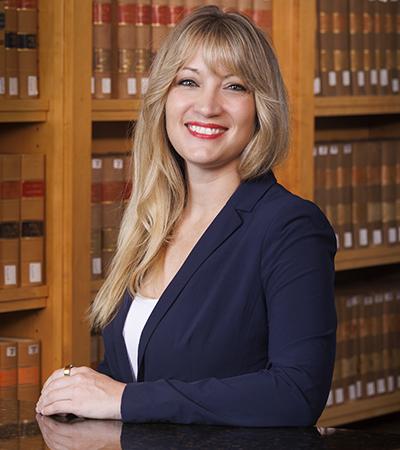
Jefferis named recipient of equality and justice award
29 Mar 2024
Professor Danielle Jefferis has been named the 2024 recipient of the Rev. Dr. Michael W. Combs Memorial Fund for Scholars of Equality and Justice Award for Faculty, presented by the Institute for Ethnic Studies at the University of Nebraska-Lincoln.
The Combs Award for Faculty recognizes faculty members whose teaching on issues pertaining to ethnicity, race, class, and nationality are innovative yet grounded. The recipient demonstrates disciplinary rigor and awareness of the need for methodologies and perspectives that challenge institutional problems on behalf of communities that are historically impacted.
Professor Jefferis’s research focuses on theories of punishment and the law and policy governing prison and detention, with an emphasis on the for-profit prison industry and immigration-related confinement. In 2023, she was part of a Nebraska research team awarded a $1M grant from the Andrew W. Mellon Foundation for their work to launch a research and collaboration hub focused on the relationship between U.S. law and race in American History.
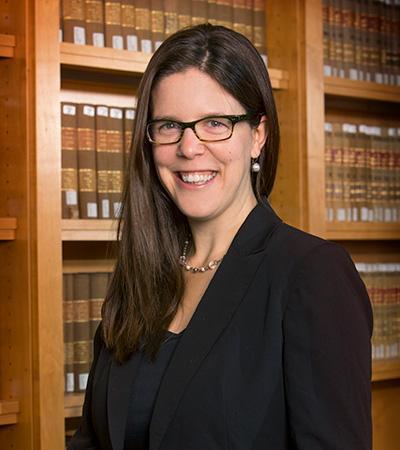
Shoemaker presents at Land, Climate, and Justice Conference
28 Mar 2024
Professor Jessica Shoemaker was an invited panelist at the Land, Climate and Justice Conference presented by the University of Virginia School of Law Program in Law, Communities and the Environment. Shoemaker presented a work-in-progress project, “Privatizing the Countryside.”
The conference provides a setting for interdisciplinary conversations about a range of topics, including property rights, land-use regulation, housing, sustainability, environmental justice, segregation, metropolitan inequality, cities, rural communities and federal-state-local relations.
At Nebraska Law, Shoemaker is the Steinhart Foundation Distinguished Professor of Law and co- directs The Rural Reconciliation Project. She has been recognized for her work on adaptive change in pluralistic land-tenure systems, as well as property law’s power to shape the contours of human communities and natural environments.
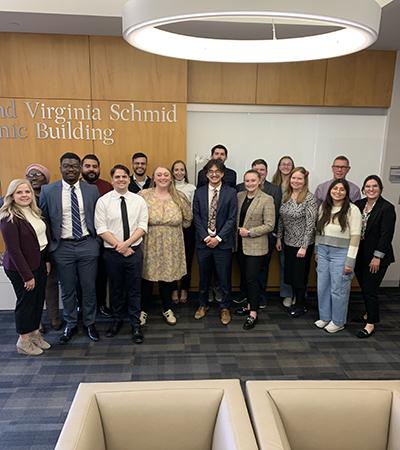
Immigration Clinic Students Host Fifth Annual Citizenship Clinic
26 Mar 2024
On Saturday, March 23, Immigration Clinic students at the College of Law conducted a Citizenship Clinic to assist individuals interested in self-filing applications to become citizens of the United States. A total of 15 individuals were assisted by volunteer students during this year’s Citizenship Clinic. In addition to College of Law Immigration Clinic students, 21 other law students assisted those applying to become citizens, as well as Professor Carol Subiabre and five of her students from the University of Nebraska’s Spanish for Law undergraduate course. Jodi Garrelts, '15, an attorney from the Immigrant Legal Center + Refugee Empowerment Center, also offered her services to the volunteer team this year.
In preparation for the event, Immigration Clinic students publicized the Clinic in various forums and by various means, created packets of materials to be used the day of the event, recruited and trained volunteers, pre-screened applicants to determine whether they were good candidates for naturalization, and orchestrated the process from start to finish on the day of the event. The Clinic was held at the Schmid Clinic Building at the College of Law. Student volunteers greeted applicants as they arrived, checked them in, and then escorted them to interview rooms where volunteers were prepared to meet with them and help them complete the necessary forms. Volunteers assisted applicants in filling out the citizenship forms, ran background checks to verify that there were no unidentified issues that might bear on applicants’ abilities to naturalize, and gave them a “next steps” checklist to use when submitting their naturalization applications.
This is the fifth year that the Immigration Clinic has hosted the Citizenship Clinic event. Given the success of the day, the Clinic plans to continue hosting the event annually in the Spring and is considering adding a Fall event in the future as well.
Immigration Clinic students who participated are: Laurel Stoncius, Jason Evans, Lou Traore, Tavia Bruxellas-McAlister, Mason Ellis, Abbey Lanzarin, Elsa Menjivar Valverde, Taylor Brown, and Josh Hairston. Law students who volunteered this year include Erin Rose Reales, Dakota Figueroa, Grace Tracey, Meg Reinhart, Elliott Lund, Nicholas Marti, Laura Vivas, Alexandra Klay, Jordyn Piper, Audrey Wagoner, Braedyn Iwan, Jessica Valdez, Martha Sanchez-Hernandez, Julia Hogeland, Murphy Cavanaugh, José Jaimes, Lionel Dalmeida, Jennifer Craven, Corrie Day, Emma Lentsch, and Anthony Budell. Undergraduate students at the University of Nebraska-Lincoln who volunteered include Aaron Archer, Evelyn Mejia, Chloe Fitzgibbon, Julia Haller, Jaqueline Lara Patino, and Emma Rapper.
None of the successes of the day could have been realized without the leadership of Professor Kevin Ruser, Immigration Clinic faculty, and involvement of Sydnee Schuyler, assistant paralegal and main support staff for the Immigration Clinic.
The Clinic extends special thanks to Cline Williams, the Nebraska/Iowa Chapter of the American Immigration Lawyers Association, and Professor Stephanie Pearlman, Associate Dean for Diversity, Equity and Inclusion at the College of Law for their generous sponsorship of this year’s event.
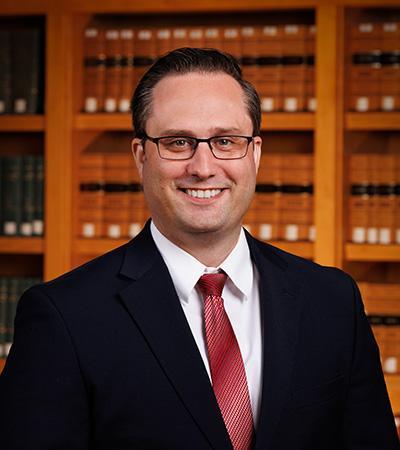
Johnson presents at Northeastern University Law School's Junior Scholars Conference
13 Mar 2024
Professor Brandon Johnson presented a work-in-progress, "Consolidation of Powers" at the Northeastern University Law School's Junior Scholars Conference. The paper addresses the ways the Supreme Court has used the language of separation of powers to increase its own role in administrative policymaking.
The conference brought together 100 junior scholars from law schools across the country to engage with their peers in a friendly environment.
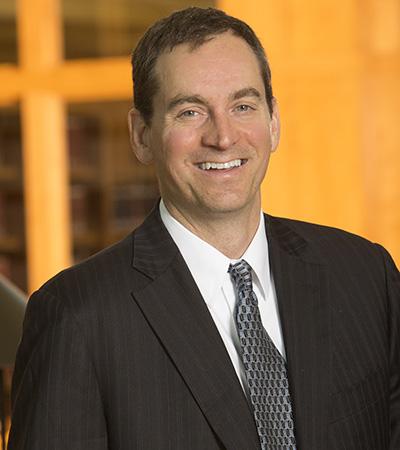
Schaefer's article published in the North Carolina Journal of International Law and Commercial Regulation
13 Mar 2024
Professor Matt Schaefer's article, Gene-Edited Crops and Food and the Bold Path Forward in U.S. Trade Agreements, has been published in the North Carolina Journal of Inerational Law and Commercial Regulation.
Read the abstract below:
Gene-edited crops and food have the capability to enhance human nutrition, food security and agricultural sustainability. In contrast to GM crops and food, most gene-editing techniques do not leave any foreign or exogenous DNA in the plant (nor in any food products made from the plant). Yet, there is a real risk that gene-edited crops and food will succumb to the negative regulatory treatment and consumer (mis)perceptions that have befallen GM crops and food. Indeed, the EU – the second largest market behind the United States – through court decision has lumped GM and gene-edited crops and food together for the same onerous regulatory treatment. The United States, in contrast, has completed regulatory reform efforts in the past five years that ensure that gene-edited crops will not be subject to restrictive pre-approvals, nor to mandatory labeling. Countries comprising the other roughly 3/5ths of world GDP have taken a variety of approaches. The countries within the Americas, led by Argentina, have largely followed the lead of the US. Approaches in Africa and Asia vary widely and are still in development.
The best strategy for the United States to ensure a favorable gene-edited crop and food regulatory environment, both in terms of approval and labeling, is to establish pro-gene-editing trade deals via new-styled, noncomprehensive trade agreements or issue-specific trade deals on a regional or bilateral basis in major markets in each continent of the globe. There are good candidates in each world region based on a variety of factors, including large market size, currently favorable or “under review” gene-editing policy, and the presence of current ongoing negotiations or prospective negotiations on a regional or bilateral new-style noncomprehensive agreement with the United States. WTO litigation will not be an effective strategy to achieve favorable regulatory treatment of gene-edited crops and food due to the collapse of the WTO Appellate Body. Moreover, even if the WTO dispute settlement system is fixed in the near future, there is always a significant risk of backlash or hardening of positions through use of WTO litigation on such issues. However, the US can use legal arguments indicating the inconsistency of anti-gene-editing approval and labeling measures with WTO commitments in its diplomacy and during negotiations with other countries. Once the United States has established pro-gene-editing entryways in each continent, the United States can seek to expand those pro-gene-editing provisions to broader regional comprehensive deals – when the US elects to re-engage in those efforts – and/or a WTO plurilateral agreement with broad subscription– when the WTO negotiating pillar revives and strengthens. Importantly, the United States should seek bolder provisions in these new agreements than was achieved in the USMCA and the China Phase I trade deal. Specifically, such agreements should pursue provisions on approval and labeling that harmonize roughly around the US approach and/or incorporate a measure of mutual recognition of gene-edited products.
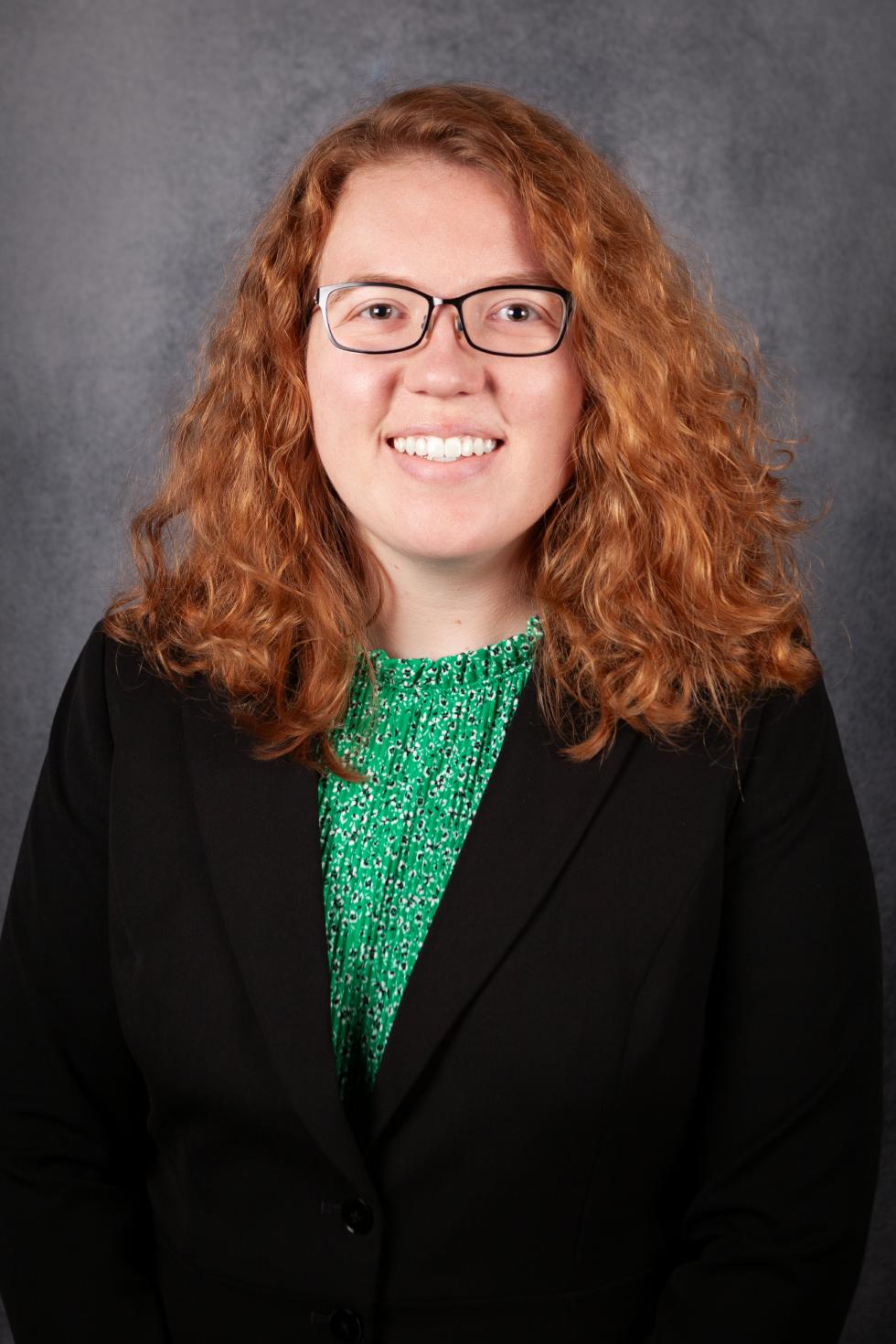
Kostal, ’24, named NSBA Rise Award recipient
12 Mar 2024
Cassandra Kostal, ’24, has been named the Nebraska State Bar Association (NSBA) 2024 Rise Award Recipient. The Rise Award is given to a law student from each of Nebraska’s law schools for their exemplary dedication to, and contributions in support of, programs sponsored by the Nebraska Lawyers Foundation throughout their law school career.
Kostal has engaged in pro bono work throughout her time in law school, beginning in the fall of her 1L year. She has supported the Debtor Defense Project, the Naturalization Clinic hosted by the Nebraska Law Immigration Clinic, and has volunteered more than 300 hours to the Tenant Assistance Project.
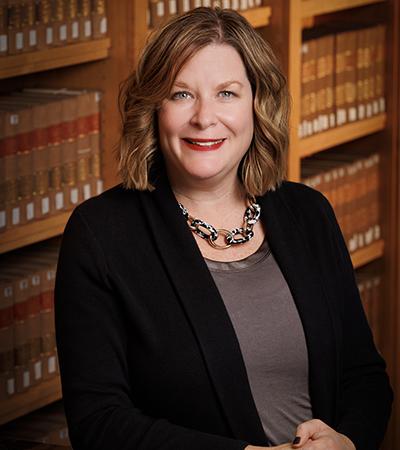
Brummond named recipient of Limitless Leadership Award
11 Mar 2024
Assistant Dean Molly Brummond has been named a recipient of the Ms. JD Limitless Leadership Award in recognition of her outstanding contributions to empowering and advancing women in the legal profession. Brummond exemplifies the three nomination criteria of Professional Excellence and Leadership, Advocacy for Gender Equity, and Community Engagement and Mentorship.
“Molly has spearheaded countless efforts to help women form connections with each other irrespective of whether we are competitors in the legal field,” said Tara Paulson, CEO of Rembolt Ludtke. “Her work has opened up a sweet spot where we can gather, feel heard, be supported, and rise by lifting each other up.”
Using her own experiences as a former practicing woman lawyer, Brummond created and now continues to expand the College’s Women’s Leadership Initiative to help women lawyers develop skills to navigate the practice of law using established leadership techniques. This Initiative includes one-on-one development and coaching sessions, special programming opportunities and regular women’s leadership conferences. Since 2017, more than 1,000 of Nebraska’s female attorneys and business professionals have attended one of the five women’s leadership conferences planned and organized by Brummond.
“Molly is relentless in her pursuit of gender equality in the law – from day one with women law students to being a source of support and encouragement for women equity partners like me,” said Marnie Jensen, partner at Husch Blackwell. “She has worked to study and determine what makes women thrive in our profession and then has presented that research so that we may all take advantage of her work.”
Brummond joined a group of researchers in 2020 to begin examining what it means for women lawyers to thrive in Nebraska, more specifically what it means for them to thrive and succeed in Nebraska’s legal community. The team interviewed lawyers from across Nebraska to hear their stories of thriving. The results have also been used to further develop programming for the Women’s Initiative, general professional development programming for the Nebraska College of Law and the greater Nebraska legal community.
Brummond is a former member of the editorial board for the National Association of Women Lawyer’s Women’s Law Journal. Locally, Brummond currently serves on the boards of directors for ACLU of Nebraska and CEDARS Youth Services, serving both since 2020. She is a former member of the executive committee (past president) and the board of directors for the Food Bank of Lincoln, a past member of the University of Nebraska-Lincoln’s Chancellor’s Commission on the Status of Women, past chair of the Lincoln Young Professionals Group and a past member of the City of Lincoln’s Parks & Recreation Advisory Board. Molly also serves her hometown community by leading leadership development programming for the Boone County Emerging Leaders Academy.
Additional recipients of this year’s awards are:
- Noorain Khan, Senior Advisor at the Ford Foundation and National Board President of the Girl Scouts of the USA
- Heather Anderson, Vice President of Original Content and Business Affairs at ESPN and UCLA Law Women LEAD Board Member
- Lannette Richardson, Law Student at Southern University Law Center and ABA Law Student Division Chair
- Microsoft, for their deep commitment to advancing gender equity and leadership in DEI initiatives.
Brummond and the other distinguished recipients will be honored at the upcoming Ms. JD Limitless Gala and Awards on April 11, 2024, at the Skirball Cultural Center in Los Angeles, California.
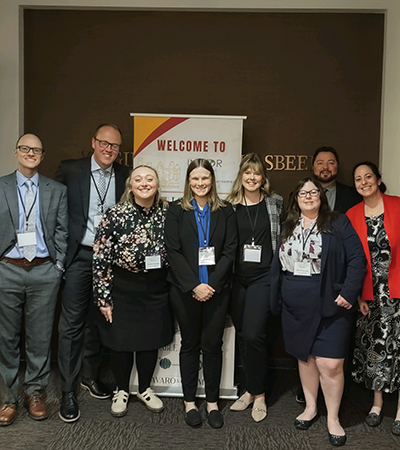
Mediation Competition Teams participate in International ADR Mediation Tournament
11 Mar 2024
Nebraska Law’s Mediation Competition Teams participated in the International ADR Mediation Tournament in Chicago March 7 to March 9, 2024. This competition involved nearly 30 teams from seven countries around the globe.
Nebraska brought two teams of three, plus one alternate, and all students competed. The team members include Chase Stock, Steve Lydick, Murphy Cavanaugh, Ashly Helfrich, Alexandria (Ally) Warneke, Holli Zimmerman, and Scott Smith (l-r). The teams were coached by Professor Kristen Blankley (right).
Warneke won first prize for the attorney/client category on a mixed-school team with a teammate from Loyola Chicago. The team including Cavanaugh, Helfrich, and Lydick placed seventh overall in the mediation category. Additionally, Lydick was named a “Top 10 Mediator” among the more than 80 student competitors.
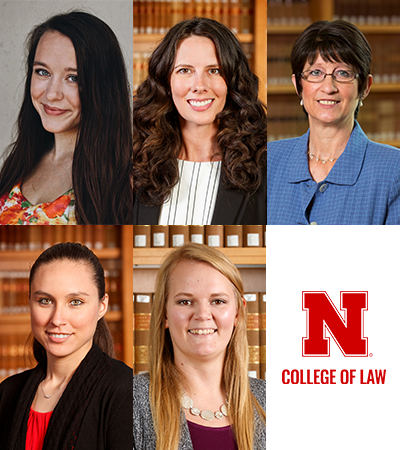
Behind the Scenes with Clinic Staff
11 Mar 2024
Each month, we give an inside look at the work happening behind the scenes at the College of Law. Clinic staff work closely with students and faculty to assist clients. As the number of clinical opportunities has grown, the clinic team continues to use their knowledge and expertise to facilitate experiential learning and support work that impacts the local community.
Clinic Staff:
Amy Derowitsch, Assistant Paralegal
Terra Garay, Children’s Justice Program Coordinator
Deanna Lubken, Office Supervisor/Paralegal
Sydnee Schuyler, Assistant Paralegal
Kelsey Van Patten, Assistant Paralegal
Q: What does your role at the college entail? What is the most fulfilling part?
AD: I’m an assistant paralegal with the Clinical Programs at the College of Law. I work primarily with the First Amendment Clinic but help support all the programs when needed. The most fulfilling part of my job is knowing that the “behind the scenes” work I do helps students and faculty make a difference in our clients’ lives.
TG: I am the Program Coordinator for the Children’s Justice Clinic and Children’s Justice Attorney Education Program.
DL: I am currently the Office Supervisor/Paralegal in the Clinical Law Programs (CLP). I have worked in the CLP since 1998. In addition to my administrative duties, I currently provide legal assistance in the Debtor Defense Clinic, Estate Planning Clinic, and Housing Justice Clinic. However, at one time or another, I have also provided support in all of the clinics within the CLP, with the exception of the Criminal Clinic. I love working with the various students, faculty, my colleagues, and being a part of the teaching team. For many students, the CLP gives them their first opportunity to be lead counsel. I enjoy watching the students grow as attorneys and gain confidence in themselves.
SS: I’m primary staff support for the Immigration Clinic and secondary support for other clinics when needed.
KVP: I provide support to Clinical Faculty, mainly Professor Brett Stohs with the Entrepreneurship Clinic, and to student attorneys who are signed up to take the clinic. I am typically the first human that most people interact with when they reach out for services of the E-Clinic, and I help determine whether we are a good fit for entrepreneurs to work with us on their legal needs.
Q: How does your work support clinical programs and/or faculty?
AD: While the students and faculty do the substantive part of the job, my role is more administrative. My work includes filing pleadings, preparing materials for court, and keeping track of the many moving pieces with all the cases we’re working on.
DL: I have always tried to provide as much assistance to the faculty as possible so they can dedicate their valuable time to teaching the students the practice of law. The paralegals in the CLP teach the students how to work in a law office setting. We review documents prepared by students and faculty for accuracy and ensure they are formatted according to court rules. We file legal documents with the court, when necessary. We review and finalize estate planning documents that students have prepared for their clients. Sometimes we are a sounding board for the students when they are trying to work out a legal issue.
SS: I assist the Clinic director and students with daily operations, document review and preparation, navigating immigration agencies and court filing procedures, case management, file integrity, and logistics.
KVP: I like to think of us as nurses to doctors, while each have their individual skill and knowledge set, they both rely on each other for different things and work together for the best outcomes for their patients. Instead of patients, our clients and students are who we are caring for and we help guide them through the messiness of legal practice. I like to think that my work helps give clinic faculty the ability to do some of their important work which is supervising our students and helping our clients achieve their goals.
Q: Where do you see the work of the clinics making the most impact? How is it reflected in the lives of clients?
AD: The impact of the Clinical Programs has been huge for Lincoln and surrounding communities. Each day students and faculty work to prevent people from being evicted, finalizing estate planning documents, start small businesses, and more.
TG: Ensuring we provide the highest quality of representation to our child clients as Guardians ad Litem and that child clients have a voice in court.
DL: CLP students provide legal representation to clients in a variety of legal matters. Whether it is ensuring that a client is allowed to stay in their home or allowed to maintain their income, the legal work of our students greatly impacts the lives of their clients. Many of our students have been involved in legislative advocacy and have played an integral part in changing legislation to improve our clients’ lives. Many low-income individuals would not receive any legal assistance if not for the CLP. With the guidance of the CLP faculty and paralegals, our students learn how to provide quality and ethical legal representation. Some students have had opportunities to argue cases before the Nebraska Court of Appeals, Nebraska Supreme Court, and the Eighth Circuit Court of Appeals.
SS: The clinics are a way for people who can’t afford an attorney to have access to quality legal representation while giving students the opportunity to learn first-hand and see how meaningful their assistance is to those who would otherwise be unable to afford legal assistance.
KVP: We’ve seen clients who are taking major risks such as leaving their full time jobs to pursue a side hustle idea. We are just a small step on their journey of owning and running a business, but they come to us because they want to make sure they are doing things the right way. To check in with a former client to hear that their business is growing and they are doing well is a good feeling. To see a former nonprofit client land a big grant so they can continue providing their charitable work is rewarding, and knowing that we helped them get what they needed to further their own mission has been impactful.
Q: What has been the most meaningful experience you’ve had while working with our clinical programs?
AD: The most meaningful experiences I’ve had so far is seeing the look on clients’ faces when they’re able to get help from the Clinic; many people are relieved and I’m thankful our community has this resource.
TG: Through the success of the CJC, we had the opportunity to launch the Children’s Justice Attorney Education Program. This has allowed us to move beyond Lancaster county and impact Juvenile Court representation in greater Nebraska.
DL: It is always heartening to observe the gratitude of a client who has had an opportunity to have his or her voice heard. Knowing that our students and faculty are providing the best legal representation possible is very meaningful to me. Listening to a student after his or her first court appearance and seeing the glow on their faces afterward brings me so much joy. Just knowing that you have been a part of their teaching experience is such an honor.
SS: When students share that they’ve been struggling with the pressures of law school or are otherwise uncertain about the future and the clinics helped them focus in on what it’s all for and why they want to help others.
Q: Describe the value of offering real-world educational opportunities like this to our students. How does it prepare them for the legal field?
AD: There’s a huge difference between learning about something and doing something. For example, in the First Amendment Clinic, this is the first time students have written their own brief or interacted with clients. I think this experience gives students a chance to actually work in the profession before they even start their careers.
TG: Students are assigned cases, partnered with experts and get hands-on experience meeting with families and appearing in court for an academic year, graduating practice-ready.
DL: The clinics prepare their students to be inclusive leaders. Some of the CLP’s students have gone on to be judges, legislators, successful litigators, sole practitioners, and leaders in their fields. The clinics give the students the confidence they need to do anything they strive to do. It is so enjoyable knowing that I have had just a small part in their education and success.
SS: The clinics are often the first time students are experiencing being primarily responsible for real clients with real legal issues. From their first client interview to their first trial appearance, having the opportunity to learn in an environment that supports and guides them through the many “firsts” they’ll experience as a new attorney is invaluable.
KVP: I think giving students the opportunity to see what it is like to be a practicing attorney is so beneficial to their law school careers. Not only do they get to experiment and be intentional with their time and apply some of the things they have learned in their law school classes, they also get the benefit to tell employers, “Hey look I’ve actually done this stuff and this is what I did.” I think for most clinic students it reaffirms their decision to go to law school and be an attorney. Having a supportive environment with the goal of learning and managing all the things clients and cases brings is truly what makes the experience worthwhile.
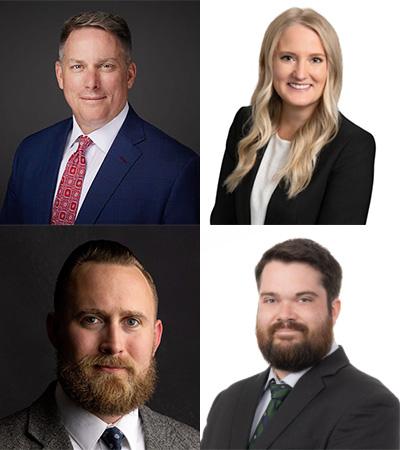
Alumni News | March 2024
09 Mar 2024
Every month, we bring you the latest updates from our alumni near and far.
ALUM NOTES
Robert S. Keith, ’96, has been inducted into the National Academy of Distinguished Neutrals.
Alyssa M. (Stokes) Peterson, ’17, has joined Texas Instruments as legal counsel.
Timothy J. Anderson, ’22, has been appointed to the United States Criminal Justice Act Panel.
ALUM IN THE NEWS
ACLU of Nebraska Legal Fellow Dylan C. Severino, ’23, was the lead author of the ACLU's report regarding recent concerns around deportation hearings.
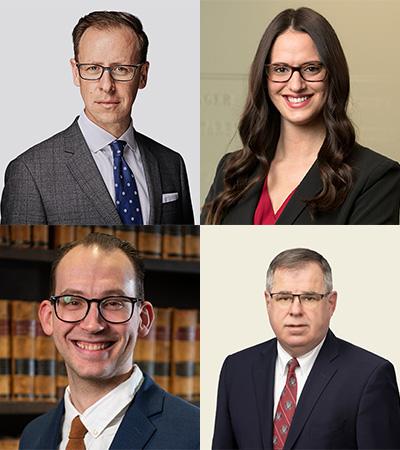
Alumni News | February 2024
28 Feb 2024
Every month, we bring you the latest updates from our alumni near and far.
ALUM NOTES
Brian J. Fahey, ’15, was named partner at the Omaha office of Fraser Stryker.
Alison J. Janecek Borer, ’17, has been named partner at the firm of Cline Williams.
Jared M. Koch, ’18, was named a partner at Blethen Berens in Mankato, Minnesota.
ALUM IN THE NEWS
The Consulate General of Japan in New York and Steptoe & Johnson PLLC announced Larry Rector, ’87, as the honorary consul of Japan in Charleston. His appointment is the first of its kind in West Virginia by the Government of Japan.
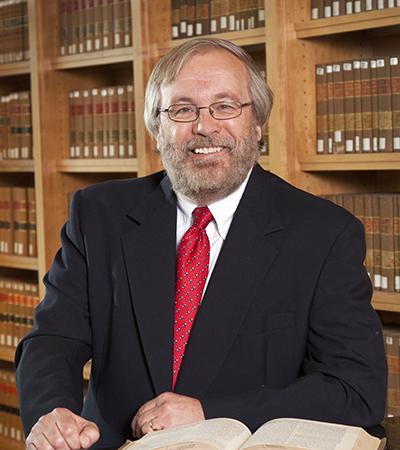
Duncan's article published in Case Western Reserve Law Review
19 Feb 2024
Professor Rick Duncan's article Why School Choice is Necessary for Religious Liberty and Freedom of Belief, has been published in the Case Western Reserve Law Review.
Read an excerpt from the abstract below:
To end this Article where it began, the letter and spirit of the First Amendment deeply values freedom of religion, thought, and belief formation. If these values are to survive in our deeply divided, pluralistic Nation, parents must be free to choose an appropriate education for their children, without having to sacrifice the benefit of public funding of education. To put it succinctly, educational funds should be directed to children and their parents, not to strictly secular government schools. School choice is the civil rights and civil liberties issue of this present age, and one way or another—either in the courts or in the states—we need to get there.
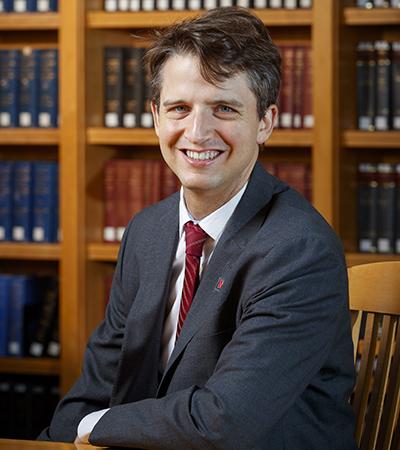
Langvardt’s article published in Yale Journal of Law & Technology
15 Feb 2024
Professor Kyle Langvardt’s article Crypto’s First Amendment Hustle has been published in the Yale Journal of Law & Technology.
Read the abstract below:
Crypto industry attorneys have argued in litigation and before regulatory agencies that the First Amendment immunizes their line of business from ordinary market regulation. On the merits, these arguments range from weak to frivolous. But they nevertheless create value for the crypto industry in two ways. First, they help to drive a predatory marketing strategy that attracts retail investors with appeals to individual liberty and resistance to “financial censorship.” Second, they tee up arguments that financial regulators’ jurisdiction should be interpreted narrowly under the “canon of constitutional avoidance” and the “major questions doctrine.” Overall, crypto’s First Amendment opportunism interferes with public efforts to protect investors, collect taxes, and fight financial crime—and ultimately, it debases the First Amendment itself. At every opportunity, agencies and courts should debunk these arguments in terms that are clear enough for the industry’s target audiences to understand.
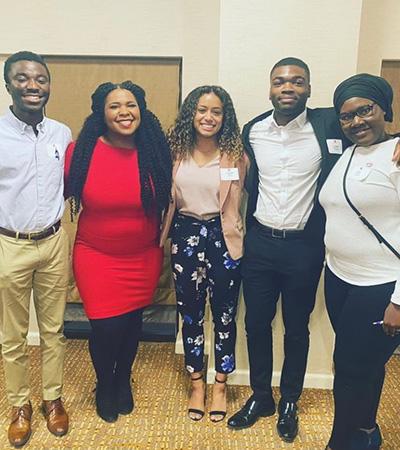
Black Law Student Association creates space for conversation and connection
13 Feb 2024
The College of Law’s Black Law Student Association (BLSA) was reactivated in 2022 with the goal of providing support to Black law students while creating educational opportunities for the entire student body.
Lionel D’Almeida, ’23, is the current BLSA vice president and was one of the students who worked to reactivate the chapter. In their 1L year, D’Almeida and his fellow executive team members saw a need for more open discussions on the impact of race and ethnicity in the context of the cases they were studying. This led them to the idea of creating a space specifically for Black law students to connect.
“It was important to give Black law students an organization that they know will champion them, especially given the low percentage of Black lawyers,” he said.
The American Bar Association reports that Black lawyers made up 5% of the legal profession in 2023, while Black Americans made up 13.6% of the population. This number shows little growth from the 4.8% of Black lawyers in 2013. In this same time span, the number of lawyers in other racial and ethnic groups has continued to grow.
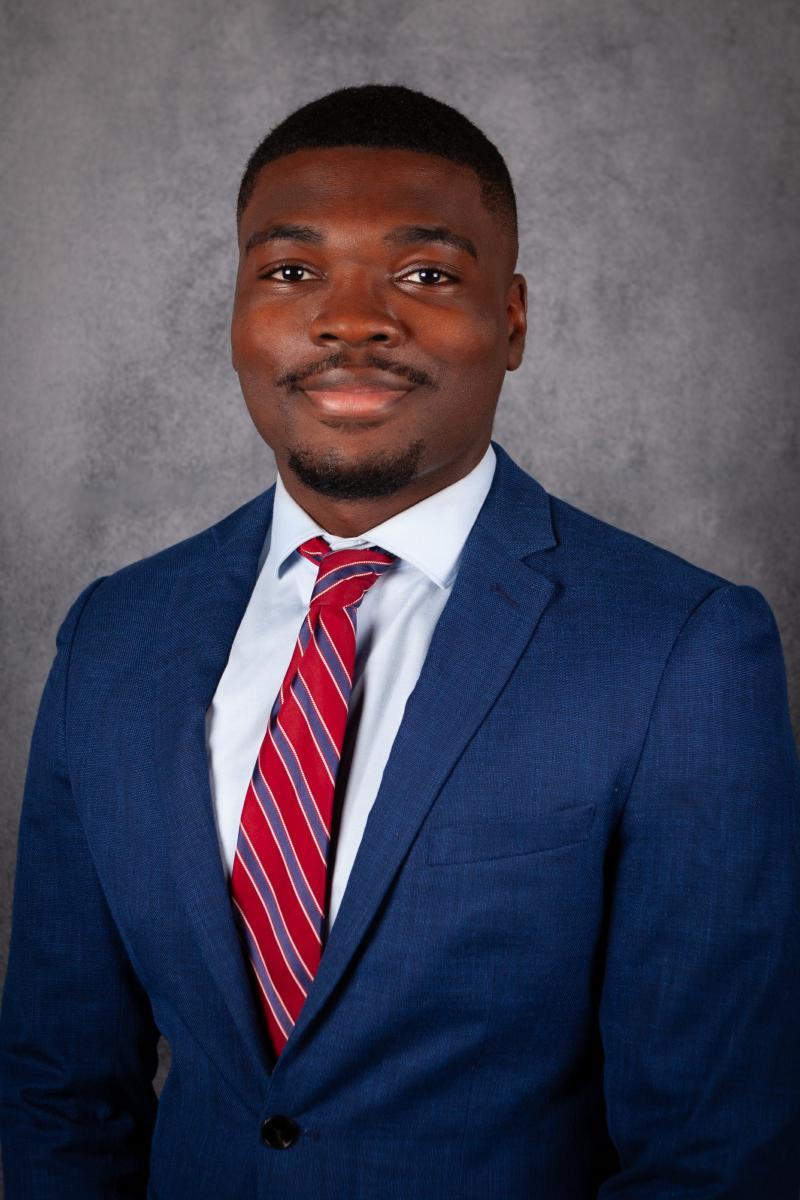
These statistics can have an immense impact in the court of law, D’Almeida said.
“If we look at criminal law, Black people and Black men, specifically, are defendants a lot of the time,” he said. “So having an attorney who looks like you is crucial.”
The effort to make the legal field more representative should start long before law school, D’Almeida said. Reaching high school or middle school students and informing them about the path to law school is one possible route for improvement.
“It’s important to start early in order to make people understand that it’s possible and that they would be supported here,” he said. “We can show them that Black law students are doing this, and you can too.”
BLSA’s efforts have also focused on connecting law students to Black professionals in the legal field and community leaders. Last year, they hosted Restorative Justice Coordinator Shakur Abdullah, who was sentenced to life in prison at 17 years old. Abdullah, who was released on parole, shared his story and his expertise on the issues of juvenile justice and mass incarceration.
Members of BLSA also had the opportunity to meet Damon Barry, ’00, Managing Partner of Ballard Spahr’s Denver and Boulder offices, and City Attorney Yohance Christie.
“Being able to make connections with current lawyers and other law students around the state has been one of the best parts of this,” D’Almeida said.
Post-graduation, D’Almeida is looking to secure a position in corporate law and possibly start his own firm one day. He said he hopes the next BLSA executive board continues to coordinate informative, engaging events and adapt to the needs of Black law students at the College of Law.
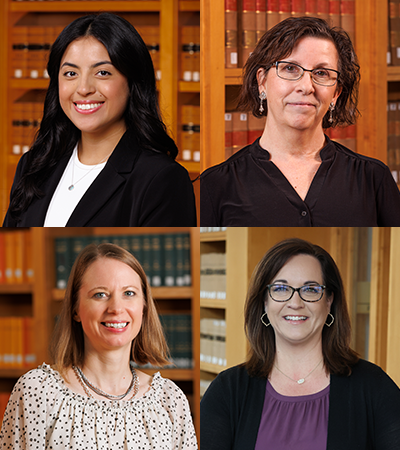
Behind the Scenes with Faculty and Administrative Support
12 Feb 2024
Each month, we’re giving an inside look at the work happening behind the scenes at the College of Law. Members of the Faculty and Administrative Support team help facilitate student success, support Nebraska Law faculty in their work both in and outside of the classroom, and create opportunities for staff development.
Faculty and Administrative Support:
Ariana De Angelo, Administrative Technician
Julie Douglass, Legal Assistant
Sabrina Ehmke Sergeant, Legal Assistant
Ann Reese, Leadership Team Administrator & Project Manager
Q: What does your role at the College of Law entail? What is the most fulfilling part?
AD: In my role at the College of Law, I welcome guests and community members to the college, collaborate with my colleagues on a variety of projects and events, assist students with event planning, and help community members find legal resources. The most fulfilling part of my role is making connections with the Nebraska Law community and being a part of making law school a positive experience for our students.
JD: I coordinate travel in my role, which includes creating travel requests, making reservations, and processing expense reports for faculty and students who are attending events. I also process non-travel expense reimbursements. I coordinate the travel, scheduling, and processing expenses for faculty candidates when they visit the college. I am also the Law Review assistant and the coordinator for Continuing Legal Education (CLE), and I work with Katie Pfannenstiel to submit events for CLE approval, man the sign-in table for CLE events, and process payments for CLE credit. I assist with Canvas navigation and coordinate exam reviews each semester. Additionally, I do multiple print jobs for faculty and help them with proofreading and editing. I process registration for conferences, payment of Bar Dues, subscriptions, etc., and assist staff and faculty with miscellaneous projects throughout the year. I am also the backup for the front desk which includes helping with room reservations, answering phone calls, making coffee, etc.
SES: I am the program coordinator for the Legal Analysis, Writing, and Research (LAWR) Program and the Managing Editor for the Rural Reconciliation Project’s online journal, The Rural Review. LAWR is a required class for first-year law students. In addition to the program director, there are 10 lecturers/adjuncts, 4 research faculty members, and 13 teaching assistants. In my role as Program Coordinator, I facilitate the running of the course by helping students, faculty, adjuncts, TAs, and other members of the College of Law community get what they need, when they need it.
AR: In my role as leadership team administrator and project manager, I assist and support Dean Moberly with scheduling, calendar management, meeting management and preparation, travel, prioritizing requests, etc. I also support other leadership team initiatives, including assisting student organizations and helping to plan staff development activities. I work to manage and facilitate multiple projects, a few of which include submissions to the ABA, U.S. News, and the Princeton Review; course evaluations, and promotion and tenure files.
Q: What is unique about working at the College of Law? What is your favorite memory so far?
AD: Working at the law college is unique because of the community we have. I always enjoy conversing with our students, faculty, and staff. My favorite memory while working at the College of Law is my first Spring Community Service Project in 2023; I had a chance to connect with students and my peers while bagging groceries at the Lincoln Food Bank.
SES: I love being part of the complex Legal Analysis, Writing, and Research Program and helping implement curricular innovations that strive to provide the best pedagogical experiences for students at a critical point in their law school careers.
AR: My colleagues are second to none. It’s the best team I’ve ever been a part of. I love how everyone pitches in to help when anyone needs it, no matter if it is in their area or not.
Q: How do you provide support to faculty, administrators, or staff?
JD: I provide support to faculty by doing travel requests, reservations, and expense reports, processing non-travel expense reimbursements, registering for conferences, and paying bar dues and subscriptions. I also assist with Canvas navigation, coordinating exam reviews, creating photo rosters and seating charts, printing, copying, proofreading, formatting/editing documents and publications, ordering books, and filling out the room reservation form for them when needed.
SES: As Managing Editor of the Rural Review, I manage the publication of material in the online journal. I edit and compose posts on rural scholarship, news, and literature, and participate in workshops and events. My involvement with the project has been an incredible opportunity to learn across disciplines, read widely, and be a part of important scholarly work that engages with a region often oversimplified or overlooked entirely.
AR: I do a lot of work in preparation for administrative team and faculty meetings, including scheduling the meetings themselves, organizing agendas, ensuring that everyone has access to the appropriate documents and materials, and for faculty meetings, tracking the governance items such as meeting minutes and vote counts. In planning staff development events, I meet with Molly Brummond to determine what opportunities we want to provide and ask staff for their input. Then, we make it all happen by contacting presenters, reserving locations, sending calendar invites, working with Ariana on RSVP forms, room reservations, ordering food, setting up and cleaning up the events, and connecting remote staff via Zoom. Facilitating these events for a large staff and faculty means coordinating a lot of moving parts.
Q: This team has an immense impact on the experience at Nebraska Law. Describe the value of providing exceptional assistance and service to our staff, faculty, and students.
AD: The value of providing exceptional assistance and service allows us to achieve shared goals, make connections, and provide a positive experience for those in our community.
JD: The value of providing exceptional assistance is that it allows faculty and staff to serve the students in their respective roles without concerning themselves with the services I provide.
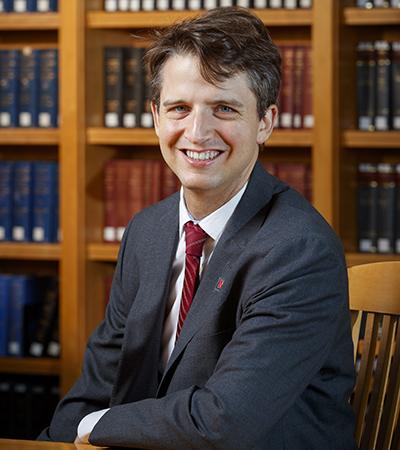
Langvardt’s essay published on Yale Journal of Regulation blog
12 Feb 2024
Professor Kyle Langvardt, with Minnesota Law professor Alan Rozenshtein, has published “The platforms should win the NetChoice content moderation cases – but narrowly” on the Yale Journal of Regulation’s Notice and Comment Blog.
The essay offers a narrow argument for overturning two state laws that require social media companies to refrain from removing certain content. Others have argued that a) social media content moderation is immune from regulation under the First Amendment or b) that requiring social media to carry certain content is constitutional because common-carrier regulation of very large media platforms is presumably constitutional. Langvardt and Rozenshtein reject both of these views. In principle, the authors see a role for government in regulating social media access. But these laws are so poorly drafted that they seem more likely to inhibit than promote user speech on social media. That is why they are unconstitutional.
Read the article here: https://www.yalejreg.com/nc/the-platforms-should-win-the-netchoice-content-moderation-cases-but-narrowly-by-kyle-langvardt-alan-z-rozenshtein/
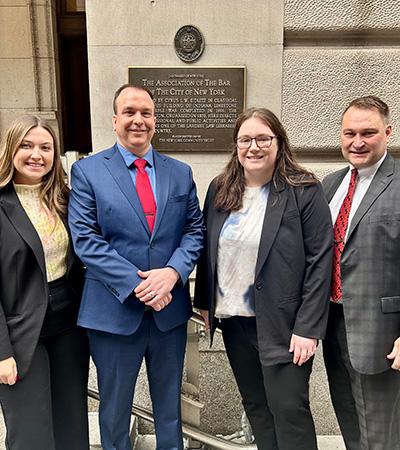
Coogan, Dabney, and Jumps place in top eight at 74th Annual National Moot Court Competition
06 Feb 2024
A Nebraska College of Law team of third-year students Kaci Jumps, Dan Coogan, and Amanda Dabney (l-r) competed at the 74th Annual National Moot Court Competition in New York City on January 29 and 30. The participants were coached by Shannon Doering, ’99 (right).
Hosted at the New York Bar Association, the competition included in two preliminary rounds. The team won against St. Mary’s Law School from Texas in the initial round but faced a setback against a team from Ohio State. Despite the loss, they accumulated sufficient points to progress and secure a spot in the Sweet Sixteen as the 14th seed for the following day.
The team won against the #3 seed on the second day of competition, the University of Pittsburgh from Pennsylvania, and advanced to the final eight. In the subsequent round, they engaged in a close competition against Memphis University from Tennessee, ultimately experiencing a narrow defeat with a split decision from the panel.
The team earned the chance to compete at the National Competition after winning the regional tournament late last year. This year’s moot court question asked the participants to argue a personal jurisdiction question and two issues stemming from the Securities Act concerning cryptocurrency. Jumps joined the National Moot Court team after winning the 2022 Grether Moot Court Competition, while Coogan and Dabney joined after winning the 77th Allen Moot Court Competition.
The team said they would like to thank all of the Nebraska students, alumni, and professionals who assisted in the preparation and practice for this tournament.